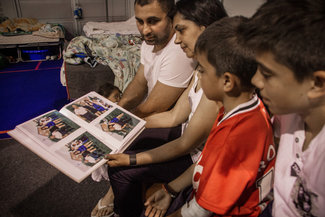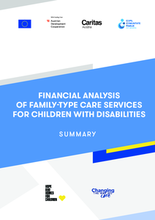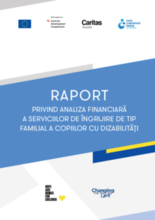

Displaying 61 - 70 of 1071
This study explores Ukrainian responses to internally displaced people during the first and second waves of war-induced displacement and internal migration in Ukraine, which took place after the annexation of Crimea in 2014 and after the full-scale invasion of 2022. It also addresses the unique challenges faced by Ukrainian social work professionals in supporting displaced people, service people and their families, disabled veterans, and orphaned children as the war continues and also for resettlement in a post-war context.
UNICEF has now issued a Request for Proposals in order to select a supplier for the provision of Baseline Evaluation of Ukraine Better Care Reform. Learn more about how to bid.
CCF Moldova conducted a comprehensive financial analysis of foster care services for children with disabilities to identify financial gaps for current foster carers and financial impediments that deter placement of children with disabilities in foster care. The report provides concrete recommendations to address gaps and cost implications of implementing new funding policies.
Serviciile alternative de tip familial sunt un element cheie în reforma sistemului de îngrijire a copilului în Moldova. Totuși, copiii cu dizabilități sunt, încă, sub-reprezentați în grupul de copii în familiile de asistenți parentali profesioniști și părinți-educatori din casele de copii de tip familie. Unul dintre obstacolele menționate de specialiștii în domeniu, de asistenții parentali profesioniști și părinții-educatori este sprijinul financiar insuficient, care limitează accesul copiilor cu dizabilități în servicii de tip familial.
This paper aimed to assess the effectiveness of psychosocial and parenting support groups, called ’Hope Groups,’ on improvements in caregiver mental health, positive parenting, and prevention of violence against children, for families affected by the war in Ukraine, using a pre/post study design.
This study protocol outlines the first randomized controlled trial of Hope Groups—a 12-session psychosocial, mental health, and parenting support program—among Ukrainians affected by war. The trial aims to assess its impact on caregiver mental health, violence prevention, and family well-being, with potential for global adaptation and scale-up in other crisis-affected settings if proven effective.
The Child Protection Officer - Alternative Care and Reintegration - reports to the Child Protection Specialist based in Odesa for supervision and works collaboratively with teams at both Country and Field Office level.
Gillian Huebner, Executive Director of the Collaborative on Global Children's Issues at Georgetown University, spoke with Karla Jones & Brooklyn Roberts about the children who have been kidnapped and disappeared during Russia's invasion of Ukraine.
The Child Protection Specialist supports the development and preparation of the Child Protection programme(s) and is responsible for the management, implementation, monitoring, reporting, and evaluation of the child protection programmes/projects within the country programme.
The consultant will work closely with UNICEF’s Kyiv and field Offices, notably within the various teams and thematic areas of child protection work, with key governmental counterparts leading the various components of return and reintegration (Ombudsman’s Office, Coordination Centre on Care Reform, Ministry of Social Policy, National Social Service, Regional Child Affairs Services, Regional Social Services, etc.) as well as with UNICEF’s implementing partners.





